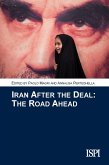It emphasizes that successful peacebuilding requires more than just ceasefire agreements; robust mechanisms for transitional justice, economic development, and inclusive governance are essential.
The book challenges traditional, narrowly focused approaches to peacemaking, advocating for a comprehensive, sustainable model rooted in historical context and political analysis.
The book begins with a historical overview of peace negotiations since the UN's inception, offering a foundation for analyzing contemporary efforts.
Case studies from Colombia, Namibia, and Northern Ireland highlight successful strategies, while also examining common pitfalls like corruption and inadequate resource allocation.
By adopting a fact-based approach and avoiding subjective interpretations, Peace Deal Facts connects to international law, economics, and sociology, enriching its analysis and offering a complete understanding of peace processes.
The book progresses methodically, introducing core concepts of peace agreement design and analyzing case studies.
It culminates in a framework for effective peace implementation, providing concrete recommendations for policymakers.
This framework is illustrated through hypothetical scenarios, demonstrating its application in diverse contexts, making it valuable for policymakers, diplomats, and students alike, seeking to understand the challenges and opportunities of peace implementation in the 21st century.
Dieser Download kann aus rechtlichen Gründen nur mit Rechnungsadresse in A, B, BG, CY, CZ, D, DK, EW, E, FIN, F, GR, H, IRL, I, LT, L, LR, M, NL, PL, P, R, S, SLO, SK ausgeliefert werden.









